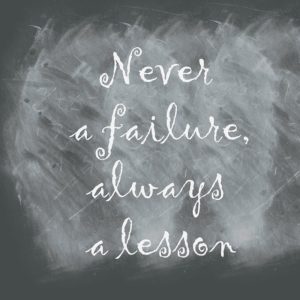
Do you ever feel like you have done some really stupid things with your money? Does it seem like your whole adult life has been one poor money decision after another? If you feel like a failure with money, you wonder why they did not teach us about money management in our high school years. And even in college…
I may be showing my age here, but I was able to sign up for my first credit card in college–at a football game, of all places! (I don’t think they are even allowed to do that now, thankfully, but the fact that they thought it was a good idea to give me and my fellow students a credit card was ridiculous. Well, actually it was good for them because they knew we would be paying back those daily on-campus lattes and even spring break vacations for the rest of our lives, with interest!!)

So, maybe a college credit card wasn’t the best idea. Also, buying a new car right off the car lot before I had even started my “real job” wasn’t the smartest decision either. I had good intentions when I drove into the Chevy dealership parking lot. At that time, I drove a ‘91 Honda Civic. It was old and ugly, but it had been a great little car for me. It had developed a major problem, though. I would be cruising down the interstate at about 70 mph–ok, 75ish–and it would just die…like the engine would turn off completely. It was a stick shift, so all I had to do was start it back up, and could continue driving. But it scared me a few times that I was going to get stuck on the side of the interstate! Of course, the engine would never die for the mechanics, so I decided it was time for a new vehicle!
I entered the dealership car lot, with my eye on a used vehicle with low mileage at a good price. Lo and behold, they had already sold it! The online site had not been updated to reflect that. So the salesman talked me into a brand new Chevy Aveo. I ended up buying it for several thousand more than I had originally planned to purchase. As I started paying off that loan, I certainly regretted having to pay those extra thousands… and then to think if I could have invested that money instead (it would have already grown to tens of thousands by now!)
So, whether we have made just a few crappy financial decisions, or a whole slew of them, what can we do about it? Just feel like a financial failure the rest of our lives? Or can we chalk it up to life lessons and move on? Yes! I believe we can and should do the latter! But where do you start when you feel so behind? Or so inadequate in handling your money?

Here are the steps to take to get past considering yourself a financial failure:
1) Acknowledge where you are
This acknowledgement is a statement at only this moment in time. It does not define you and it certainly doesn’t define your future. If anything, it makes you more determined to succeed in the future. A year from now, you will look back to this day, and think, “Wow, was that really where I was financially a year ago? Did I really feel like a failure? Look where I am now!”
I know this may be painful or at least tough to stomach, but take a look at where you are in your current financial journey. Are you barely keeping your head above water? Or are you drowning? Is there always one budget category you blow every month? Or is it several or even all of them? Get a good look at your checking accounts, savings accounts, money invested for the future, and your debts. Again, don’t put yourself down if it is frustrating to look at. There is no shame, no matter how dire the situation is! Just get the information you need, and leave it at that!
By the way, if you need help figuring out where you currently stand financially, check out this post.
2) Focus on your current strengths
A large number of people wouldn’t describe themselves as “good with money”, but they have so many other things going for them. They are a gourmet chef in the kitchen, their home is beautifully decorated and organized, they are part of wonderful volunteer activities, they have a close group of friends to share their life with, their kids and husband adore them, and they are very talented and successful in whatever career or hobby they have chosen to pursue. You do have some super powers–I know you do!

Even if none of these things describe you, really think about your strengths. You may have grown up in a really bad situation, or you faced adversity later in life, and you have overcome that. You may be one of those people who is always positive, no matter what life throws your way. (I, for one, certainly appreciate those people, as I tend to be more negative about things.) Whether you feel like you only have one strength or several, focus on the strength(s) for a moment.
You are valued and have so much worth! Continue to recognize that daily. Brag on yourself a little! I am giving you permission to do that! Share your strengths in the comments if you don’t mind. I love hearing from my readers!
3) Use those strengths (or super powers!!) to your advantage
How can the things you are naturally good at help you work toward your financial dream life? If you are a “born organized” person, this can come in super handy when you decide to get organized with your finances. If you are a master in the kitchen, your ability to meal plan and prep (or whip something up out of things already in your pantry), can be used to keep your grocery budget under control. This talent can also can be put to good use when planning and preparing your household budget. If you have a hobby that you enjoy, it is highly possible you can turn that into extra income! Can you think of some other ways to use your strengths as money-making or money-saving opportunities? Are you able to see some light shining through the darkness of failure yet?

4) Consider where you would like to be with your finances
You know that where you currently are is not where you want to be five or ten years from now. So set some future financial goals. Do you have debt you would like to pay off? Do you need a “rainy day” or “emergency” fund? Would you like to start saving for retirement? Or save for a down payment on a house? Maybe it’s something else you have your heart set on.
Whatever it is, write it down and post where you see it daily. Start thinking about what you can do to make progress toward your goal. This should help you think differently about your money and keep you encouraged about WHY you want to get serious about managing your money.
5) Identify and change your current habits
What are your current money habits? Can you pinpoint any specifically that are sabotaging your financial freedom? What can you do to replace that bad habit with a good habit?
If credit cards are getting you in trouble, leave them out of your wallet and also delete them from your online accounts. If you want to go really crazy, switch to cash envelopes only.
Is Amazon Prime (or another online retailer) too easy to click and buy, causing you to spend LOTS of money on things you don’t really need anyway? First off, log out of it! Instead of purchasing the item every time you think you need something, add that item to a list and wait a few days to see if it is still that important to spend the money on. Also, check with your spouse, and see if they think it is a need as well. (That is usually a surefire way in our household to control expenses! Ha!)

No matter where you stand with your money now, it does NOT mean you are a failure or that you forever define yourself as “bad with money.” It just means you have the opportunity to improve and the opportunity to start RIGHT WHERE YOU ARE!
Focus on your strengths, use them to your advantage, set your future goals, then change your habits to help you achieve those goals!
Go ahead–put one foot in front of the other, and take those next steps toward making your future financial dreams come true.

As always, steward intentionally, and start now, beginning right where you are.
Heather
